Business Law Assignment: Corporations, Partnerships, and Contracts
VerifiedAdded on 2023/03/17
|11
|2377
|48
Homework Assignment
AI Summary
This business law assignment analyzes two case studies using the ILAC (Issues, Law, Application, Conclusion) format. The first case examines the application of the corporate veil, restraint of trade clauses, and director liability in a scenario involving a former sales representative who starts a competing business. The second case explores the liabilities of partners in a general partnership under the Partnership Act 1892, focusing on issues of agency, contract validity, and financial obligations. The assignment addresses the legal implications of actions taken by partners, including unauthorized transactions and the limitations imposed by partnership agreements. The solution provides a detailed analysis of the legal principles, their application to the facts of each case, and the resulting conclusions regarding the liabilities of the parties involved.
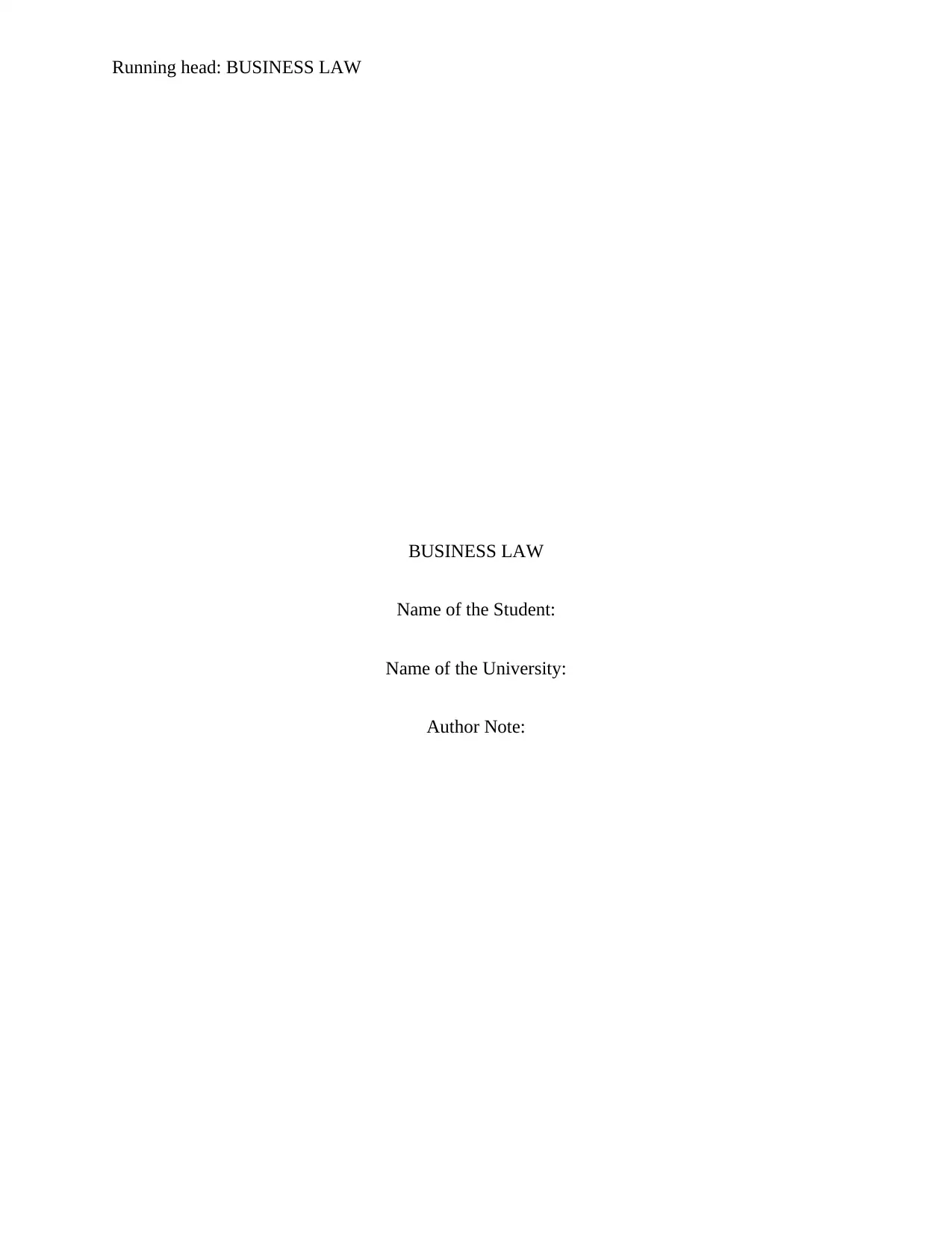
Running head: BUSINESS LAW
BUSINESS LAW
Name of the Student:
Name of the University:
Author Note:
BUSINESS LAW
Name of the Student:
Name of the University:
Author Note:
Paraphrase This Document
Need a fresh take? Get an instant paraphrase of this document with our AI Paraphraser
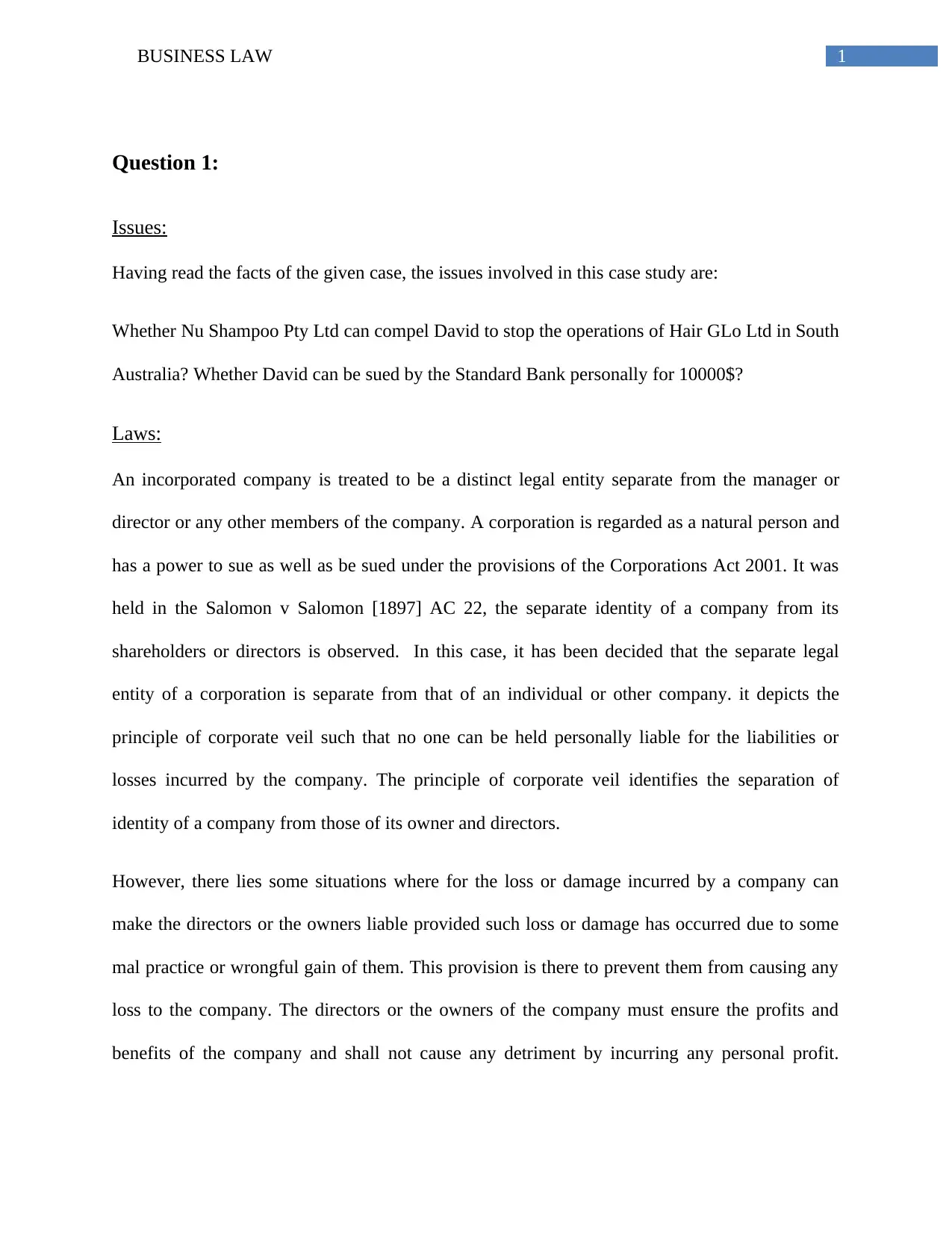
1BUSINESS LAW
Question 1:
Issues:
Having read the facts of the given case, the issues involved in this case study are:
Whether Nu Shampoo Pty Ltd can compel David to stop the operations of Hair GLo Ltd in South
Australia? Whether David can be sued by the Standard Bank personally for 10000$?
Laws:
An incorporated company is treated to be a distinct legal entity separate from the manager or
director or any other members of the company. A corporation is regarded as a natural person and
has a power to sue as well as be sued under the provisions of the Corporations Act 2001. It was
held in the Salomon v Salomon [1897] AC 22, the separate identity of a company from its
shareholders or directors is observed. In this case, it has been decided that the separate legal
entity of a corporation is separate from that of an individual or other company. it depicts the
principle of corporate veil such that no one can be held personally liable for the liabilities or
losses incurred by the company. The principle of corporate veil identifies the separation of
identity of a company from those of its owner and directors.
However, there lies some situations where for the loss or damage incurred by a company can
make the directors or the owners liable provided such loss or damage has occurred due to some
mal practice or wrongful gain of them. This provision is there to prevent them from causing any
loss to the company. The directors or the owners of the company must ensure the profits and
benefits of the company and shall not cause any detriment by incurring any personal profit.
Question 1:
Issues:
Having read the facts of the given case, the issues involved in this case study are:
Whether Nu Shampoo Pty Ltd can compel David to stop the operations of Hair GLo Ltd in South
Australia? Whether David can be sued by the Standard Bank personally for 10000$?
Laws:
An incorporated company is treated to be a distinct legal entity separate from the manager or
director or any other members of the company. A corporation is regarded as a natural person and
has a power to sue as well as be sued under the provisions of the Corporations Act 2001. It was
held in the Salomon v Salomon [1897] AC 22, the separate identity of a company from its
shareholders or directors is observed. In this case, it has been decided that the separate legal
entity of a corporation is separate from that of an individual or other company. it depicts the
principle of corporate veil such that no one can be held personally liable for the liabilities or
losses incurred by the company. The principle of corporate veil identifies the separation of
identity of a company from those of its owner and directors.
However, there lies some situations where for the loss or damage incurred by a company can
make the directors or the owners liable provided such loss or damage has occurred due to some
mal practice or wrongful gain of them. This provision is there to prevent them from causing any
loss to the company. The directors or the owners of the company must ensure the profits and
benefits of the company and shall not cause any detriment by incurring any personal profit.
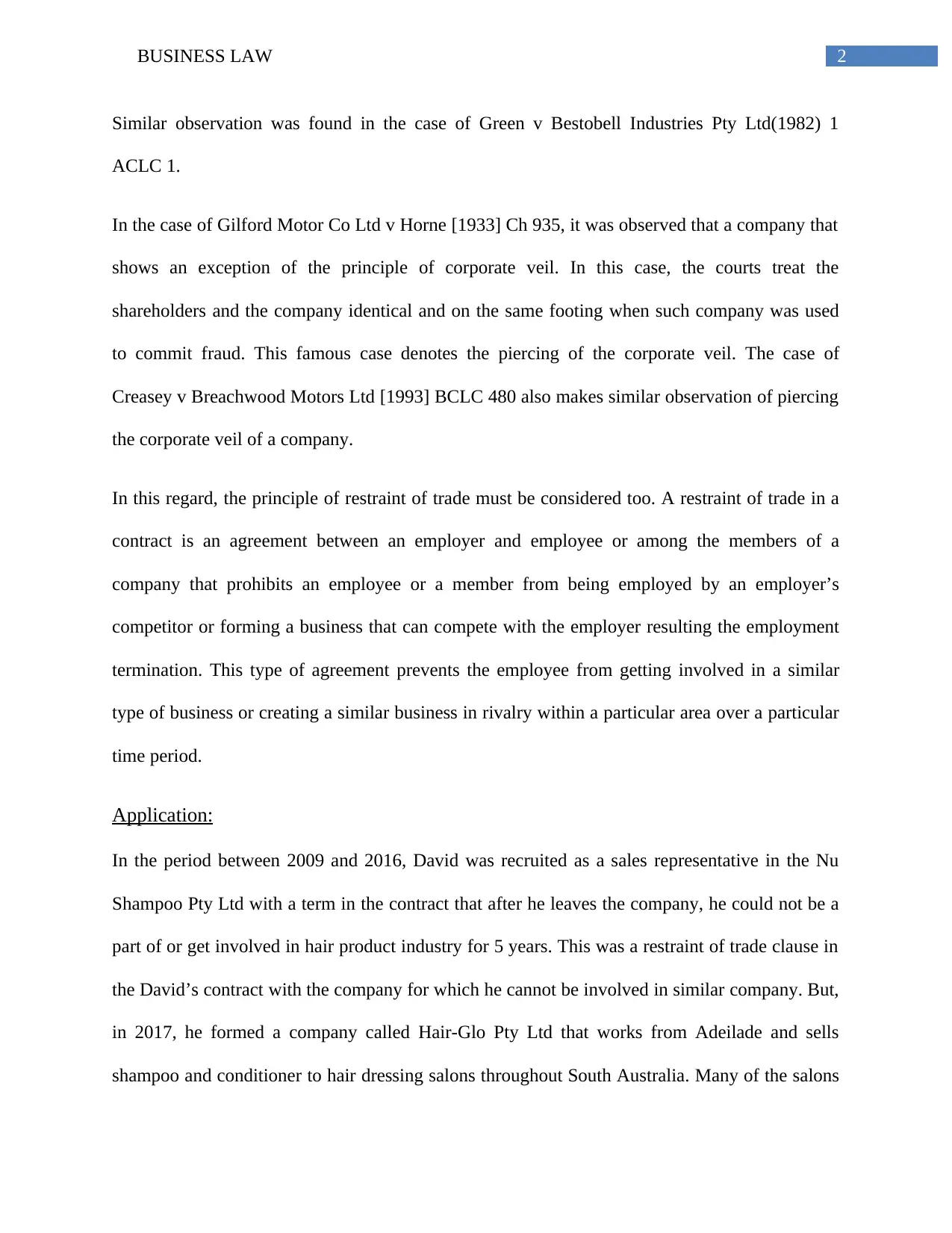
2BUSINESS LAW
Similar observation was found in the case of Green v Bestobell Industries Pty Ltd(1982) 1
ACLC 1.
In the case of Gilford Motor Co Ltd v Horne [1933] Ch 935, it was observed that a company that
shows an exception of the principle of corporate veil. In this case, the courts treat the
shareholders and the company identical and on the same footing when such company was used
to commit fraud. This famous case denotes the piercing of the corporate veil. The case of
Creasey v Breachwood Motors Ltd [1993] BCLC 480 also makes similar observation of piercing
the corporate veil of a company.
In this regard, the principle of restraint of trade must be considered too. A restraint of trade in a
contract is an agreement between an employer and employee or among the members of a
company that prohibits an employee or a member from being employed by an employer’s
competitor or forming a business that can compete with the employer resulting the employment
termination. This type of agreement prevents the employee from getting involved in a similar
type of business or creating a similar business in rivalry within a particular area over a particular
time period.
Application:
In the period between 2009 and 2016, David was recruited as a sales representative in the Nu
Shampoo Pty Ltd with a term in the contract that after he leaves the company, he could not be a
part of or get involved in hair product industry for 5 years. This was a restraint of trade clause in
the David’s contract with the company for which he cannot be involved in similar company. But,
in 2017, he formed a company called Hair-Glo Pty Ltd that works from Adeilade and sells
shampoo and conditioner to hair dressing salons throughout South Australia. Many of the salons
Similar observation was found in the case of Green v Bestobell Industries Pty Ltd(1982) 1
ACLC 1.
In the case of Gilford Motor Co Ltd v Horne [1933] Ch 935, it was observed that a company that
shows an exception of the principle of corporate veil. In this case, the courts treat the
shareholders and the company identical and on the same footing when such company was used
to commit fraud. This famous case denotes the piercing of the corporate veil. The case of
Creasey v Breachwood Motors Ltd [1993] BCLC 480 also makes similar observation of piercing
the corporate veil of a company.
In this regard, the principle of restraint of trade must be considered too. A restraint of trade in a
contract is an agreement between an employer and employee or among the members of a
company that prohibits an employee or a member from being employed by an employer’s
competitor or forming a business that can compete with the employer resulting the employment
termination. This type of agreement prevents the employee from getting involved in a similar
type of business or creating a similar business in rivalry within a particular area over a particular
time period.
Application:
In the period between 2009 and 2016, David was recruited as a sales representative in the Nu
Shampoo Pty Ltd with a term in the contract that after he leaves the company, he could not be a
part of or get involved in hair product industry for 5 years. This was a restraint of trade clause in
the David’s contract with the company for which he cannot be involved in similar company. But,
in 2017, he formed a company called Hair-Glo Pty Ltd that works from Adeilade and sells
shampoo and conditioner to hair dressing salons throughout South Australia. Many of the salons
⊘ This is a preview!⊘
Do you want full access?
Subscribe today to unlock all pages.

Trusted by 1+ million students worldwide
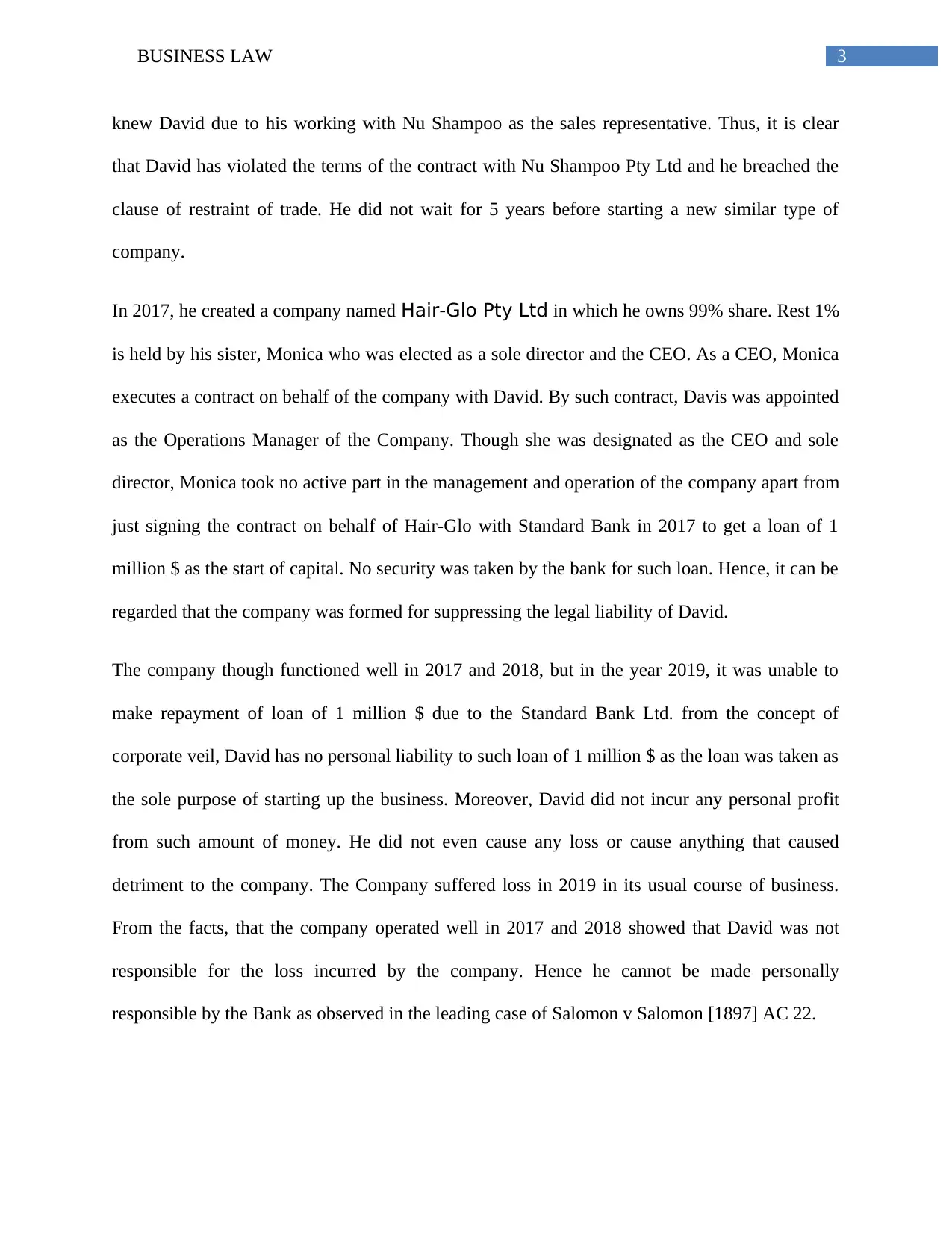
3BUSINESS LAW
knew David due to his working with Nu Shampoo as the sales representative. Thus, it is clear
that David has violated the terms of the contract with Nu Shampoo Pty Ltd and he breached the
clause of restraint of trade. He did not wait for 5 years before starting a new similar type of
company.
In 2017, he created a company named Hair-Glo Pty Ltd in which he owns 99% share. Rest 1%
is held by his sister, Monica who was elected as a sole director and the CEO. As a CEO, Monica
executes a contract on behalf of the company with David. By such contract, Davis was appointed
as the Operations Manager of the Company. Though she was designated as the CEO and sole
director, Monica took no active part in the management and operation of the company apart from
just signing the contract on behalf of Hair-Glo with Standard Bank in 2017 to get a loan of 1
million $ as the start of capital. No security was taken by the bank for such loan. Hence, it can be
regarded that the company was formed for suppressing the legal liability of David.
The company though functioned well in 2017 and 2018, but in the year 2019, it was unable to
make repayment of loan of 1 million $ due to the Standard Bank Ltd. from the concept of
corporate veil, David has no personal liability to such loan of 1 million $ as the loan was taken as
the sole purpose of starting up the business. Moreover, David did not incur any personal profit
from such amount of money. He did not even cause any loss or cause anything that caused
detriment to the company. The Company suffered loss in 2019 in its usual course of business.
From the facts, that the company operated well in 2017 and 2018 showed that David was not
responsible for the loss incurred by the company. Hence he cannot be made personally
responsible by the Bank as observed in the leading case of Salomon v Salomon [1897] AC 22.
knew David due to his working with Nu Shampoo as the sales representative. Thus, it is clear
that David has violated the terms of the contract with Nu Shampoo Pty Ltd and he breached the
clause of restraint of trade. He did not wait for 5 years before starting a new similar type of
company.
In 2017, he created a company named Hair-Glo Pty Ltd in which he owns 99% share. Rest 1%
is held by his sister, Monica who was elected as a sole director and the CEO. As a CEO, Monica
executes a contract on behalf of the company with David. By such contract, Davis was appointed
as the Operations Manager of the Company. Though she was designated as the CEO and sole
director, Monica took no active part in the management and operation of the company apart from
just signing the contract on behalf of Hair-Glo with Standard Bank in 2017 to get a loan of 1
million $ as the start of capital. No security was taken by the bank for such loan. Hence, it can be
regarded that the company was formed for suppressing the legal liability of David.
The company though functioned well in 2017 and 2018, but in the year 2019, it was unable to
make repayment of loan of 1 million $ due to the Standard Bank Ltd. from the concept of
corporate veil, David has no personal liability to such loan of 1 million $ as the loan was taken as
the sole purpose of starting up the business. Moreover, David did not incur any personal profit
from such amount of money. He did not even cause any loss or cause anything that caused
detriment to the company. The Company suffered loss in 2019 in its usual course of business.
From the facts, that the company operated well in 2017 and 2018 showed that David was not
responsible for the loss incurred by the company. Hence he cannot be made personally
responsible by the Bank as observed in the leading case of Salomon v Salomon [1897] AC 22.
Paraphrase This Document
Need a fresh take? Get an instant paraphrase of this document with our AI Paraphraser
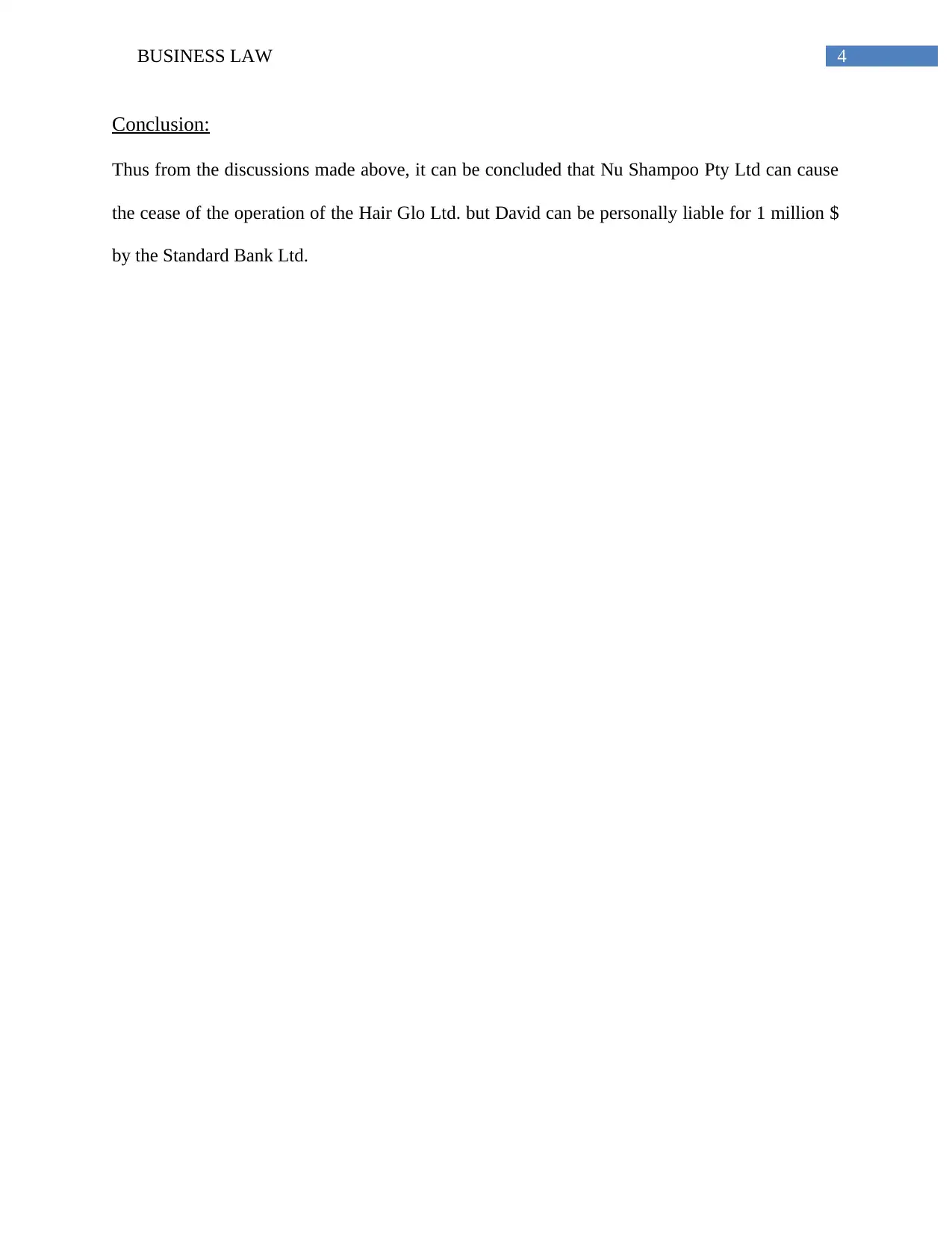
4BUSINESS LAW
Conclusion:
Thus from the discussions made above, it can be concluded that Nu Shampoo Pty Ltd can cause
the cease of the operation of the Hair Glo Ltd. but David can be personally liable for 1 million $
by the Standard Bank Ltd.
Conclusion:
Thus from the discussions made above, it can be concluded that Nu Shampoo Pty Ltd can cause
the cease of the operation of the Hair Glo Ltd. but David can be personally liable for 1 million $
by the Standard Bank Ltd.
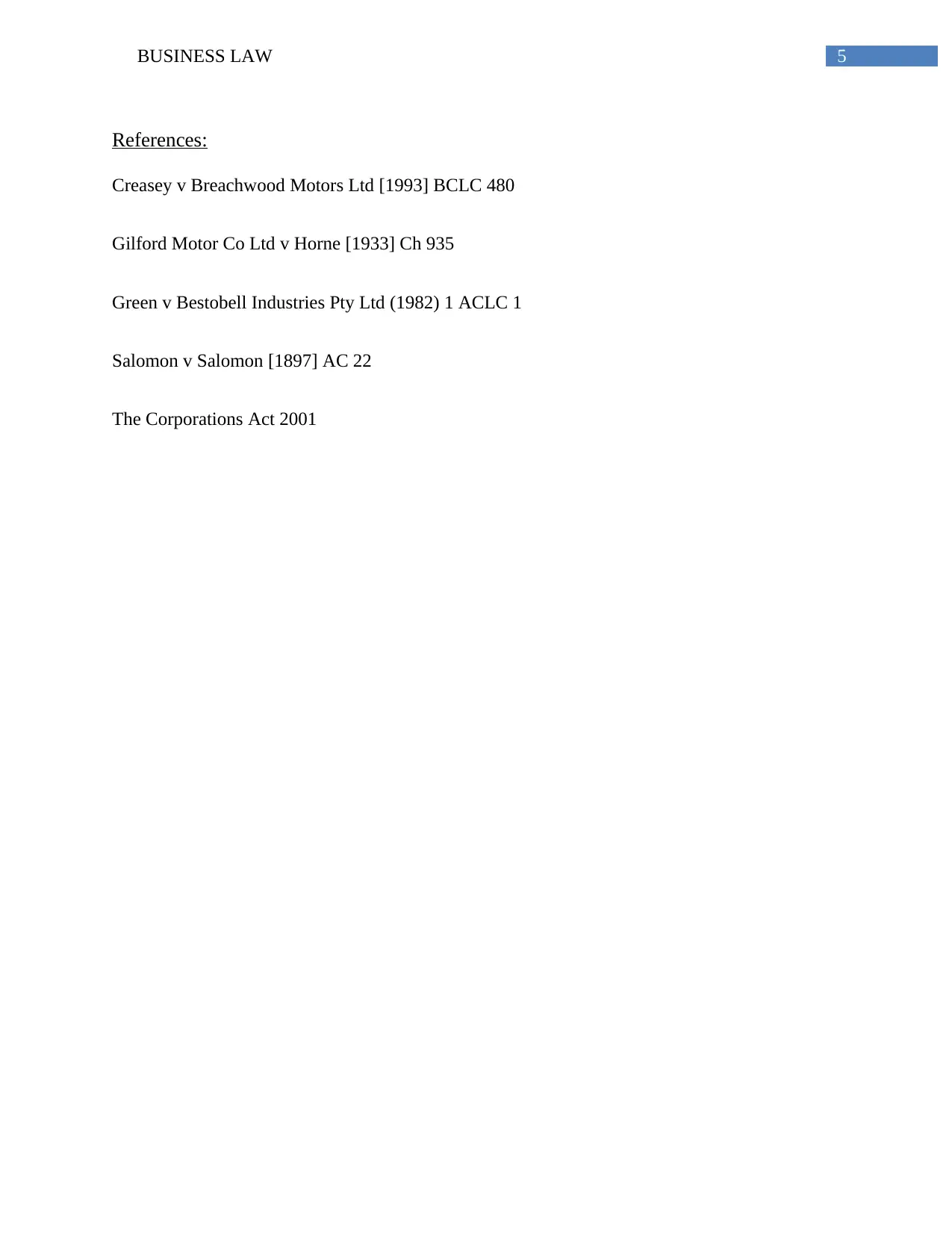
5BUSINESS LAW
References:
Creasey v Breachwood Motors Ltd [1993] BCLC 480
Gilford Motor Co Ltd v Horne [1933] Ch 935
Green v Bestobell Industries Pty Ltd (1982) 1 ACLC 1
Salomon v Salomon [1897] AC 22
The Corporations Act 2001
References:
Creasey v Breachwood Motors Ltd [1993] BCLC 480
Gilford Motor Co Ltd v Horne [1933] Ch 935
Green v Bestobell Industries Pty Ltd (1982) 1 ACLC 1
Salomon v Salomon [1897] AC 22
The Corporations Act 2001
⊘ This is a preview!⊘
Do you want full access?
Subscribe today to unlock all pages.

Trusted by 1+ million students worldwide
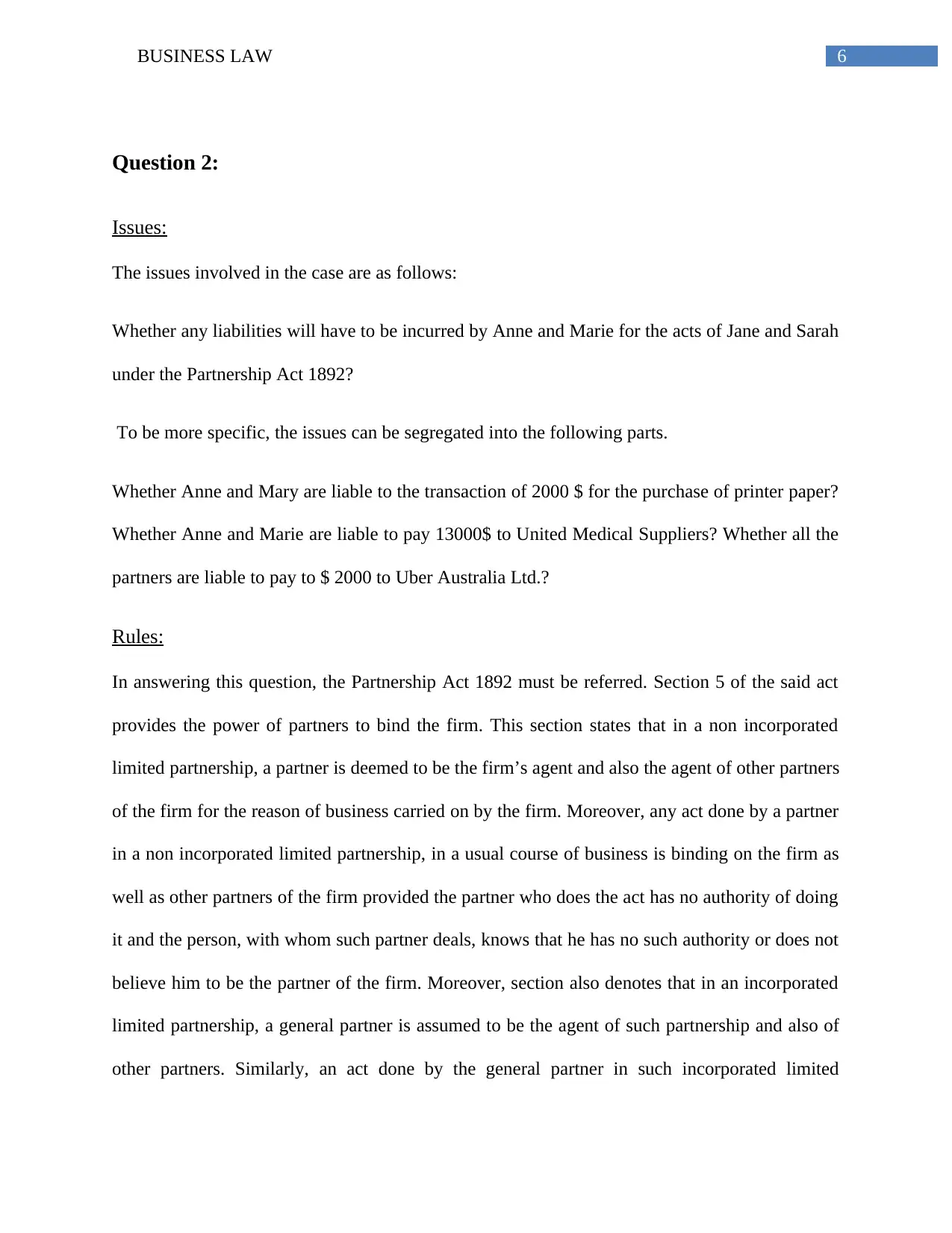
6BUSINESS LAW
Question 2:
Issues:
The issues involved in the case are as follows:
Whether any liabilities will have to be incurred by Anne and Marie for the acts of Jane and Sarah
under the Partnership Act 1892?
To be more specific, the issues can be segregated into the following parts.
Whether Anne and Mary are liable to the transaction of 2000 $ for the purchase of printer paper?
Whether Anne and Marie are liable to pay 13000$ to United Medical Suppliers? Whether all the
partners are liable to pay to $ 2000 to Uber Australia Ltd.?
Rules:
In answering this question, the Partnership Act 1892 must be referred. Section 5 of the said act
provides the power of partners to bind the firm. This section states that in a non incorporated
limited partnership, a partner is deemed to be the firm’s agent and also the agent of other partners
of the firm for the reason of business carried on by the firm. Moreover, any act done by a partner
in a non incorporated limited partnership, in a usual course of business is binding on the firm as
well as other partners of the firm provided the partner who does the act has no authority of doing
it and the person, with whom such partner deals, knows that he has no such authority or does not
believe him to be the partner of the firm. Moreover, section also denotes that in an incorporated
limited partnership, a general partner is assumed to be the agent of such partnership and also of
other partners. Similarly, an act done by the general partner in such incorporated limited
Question 2:
Issues:
The issues involved in the case are as follows:
Whether any liabilities will have to be incurred by Anne and Marie for the acts of Jane and Sarah
under the Partnership Act 1892?
To be more specific, the issues can be segregated into the following parts.
Whether Anne and Mary are liable to the transaction of 2000 $ for the purchase of printer paper?
Whether Anne and Marie are liable to pay 13000$ to United Medical Suppliers? Whether all the
partners are liable to pay to $ 2000 to Uber Australia Ltd.?
Rules:
In answering this question, the Partnership Act 1892 must be referred. Section 5 of the said act
provides the power of partners to bind the firm. This section states that in a non incorporated
limited partnership, a partner is deemed to be the firm’s agent and also the agent of other partners
of the firm for the reason of business carried on by the firm. Moreover, any act done by a partner
in a non incorporated limited partnership, in a usual course of business is binding on the firm as
well as other partners of the firm provided the partner who does the act has no authority of doing
it and the person, with whom such partner deals, knows that he has no such authority or does not
believe him to be the partner of the firm. Moreover, section also denotes that in an incorporated
limited partnership, a general partner is assumed to be the agent of such partnership and also of
other partners. Similarly, an act done by the general partner in such incorporated limited
Paraphrase This Document
Need a fresh take? Get an instant paraphrase of this document with our AI Paraphraser
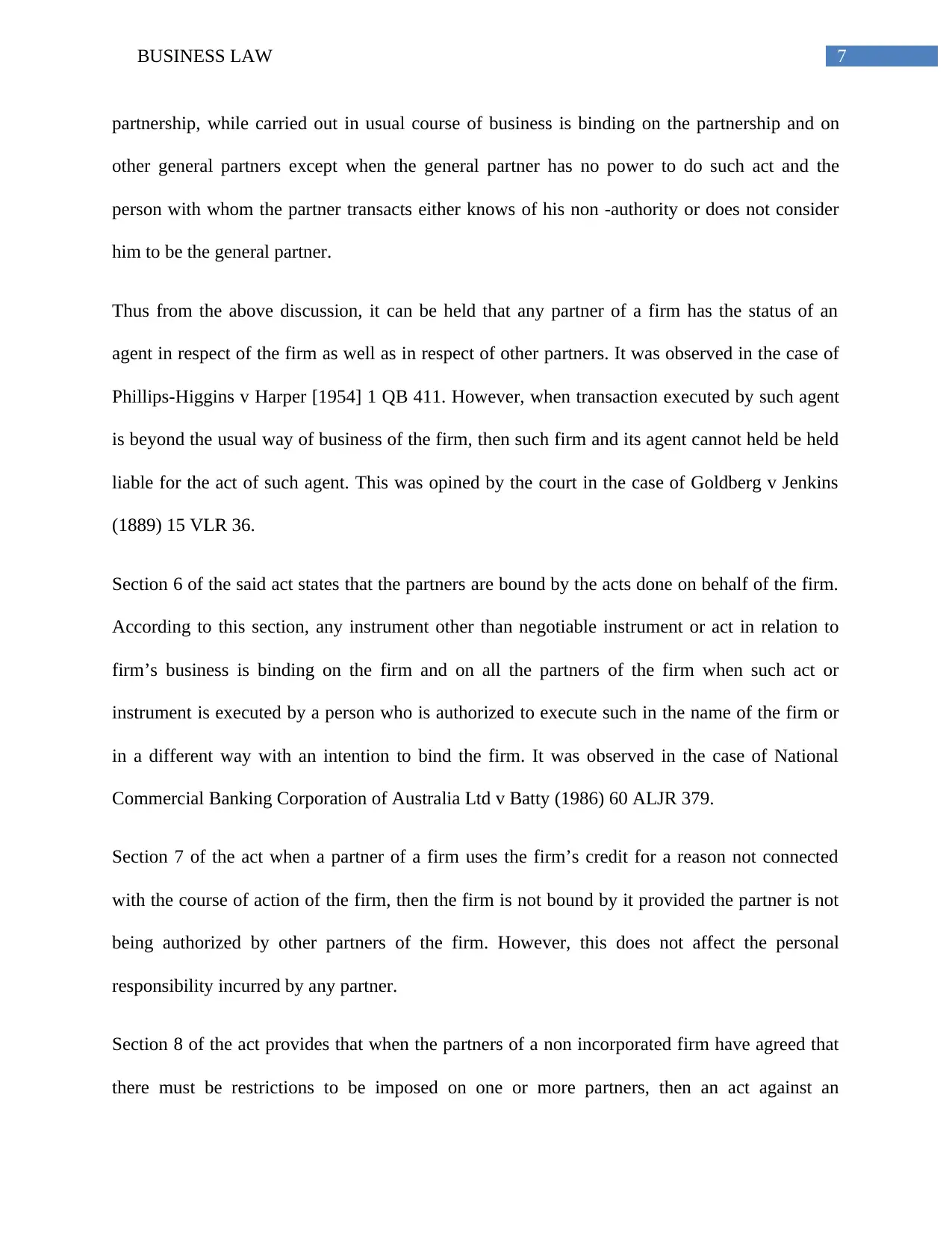
7BUSINESS LAW
partnership, while carried out in usual course of business is binding on the partnership and on
other general partners except when the general partner has no power to do such act and the
person with whom the partner transacts either knows of his non -authority or does not consider
him to be the general partner.
Thus from the above discussion, it can be held that any partner of a firm has the status of an
agent in respect of the firm as well as in respect of other partners. It was observed in the case of
Phillips-Higgins v Harper [1954] 1 QB 411. However, when transaction executed by such agent
is beyond the usual way of business of the firm, then such firm and its agent cannot held be held
liable for the act of such agent. This was opined by the court in the case of Goldberg v Jenkins
(1889) 15 VLR 36.
Section 6 of the said act states that the partners are bound by the acts done on behalf of the firm.
According to this section, any instrument other than negotiable instrument or act in relation to
firm’s business is binding on the firm and on all the partners of the firm when such act or
instrument is executed by a person who is authorized to execute such in the name of the firm or
in a different way with an intention to bind the firm. It was observed in the case of National
Commercial Banking Corporation of Australia Ltd v Batty (1986) 60 ALJR 379.
Section 7 of the act when a partner of a firm uses the firm’s credit for a reason not connected
with the course of action of the firm, then the firm is not bound by it provided the partner is not
being authorized by other partners of the firm. However, this does not affect the personal
responsibility incurred by any partner.
Section 8 of the act provides that when the partners of a non incorporated firm have agreed that
there must be restrictions to be imposed on one or more partners, then an act against an
partnership, while carried out in usual course of business is binding on the partnership and on
other general partners except when the general partner has no power to do such act and the
person with whom the partner transacts either knows of his non -authority or does not consider
him to be the general partner.
Thus from the above discussion, it can be held that any partner of a firm has the status of an
agent in respect of the firm as well as in respect of other partners. It was observed in the case of
Phillips-Higgins v Harper [1954] 1 QB 411. However, when transaction executed by such agent
is beyond the usual way of business of the firm, then such firm and its agent cannot held be held
liable for the act of such agent. This was opined by the court in the case of Goldberg v Jenkins
(1889) 15 VLR 36.
Section 6 of the said act states that the partners are bound by the acts done on behalf of the firm.
According to this section, any instrument other than negotiable instrument or act in relation to
firm’s business is binding on the firm and on all the partners of the firm when such act or
instrument is executed by a person who is authorized to execute such in the name of the firm or
in a different way with an intention to bind the firm. It was observed in the case of National
Commercial Banking Corporation of Australia Ltd v Batty (1986) 60 ALJR 379.
Section 7 of the act when a partner of a firm uses the firm’s credit for a reason not connected
with the course of action of the firm, then the firm is not bound by it provided the partner is not
being authorized by other partners of the firm. However, this does not affect the personal
responsibility incurred by any partner.
Section 8 of the act provides that when the partners of a non incorporated firm have agreed that
there must be restrictions to be imposed on one or more partners, then an act against an
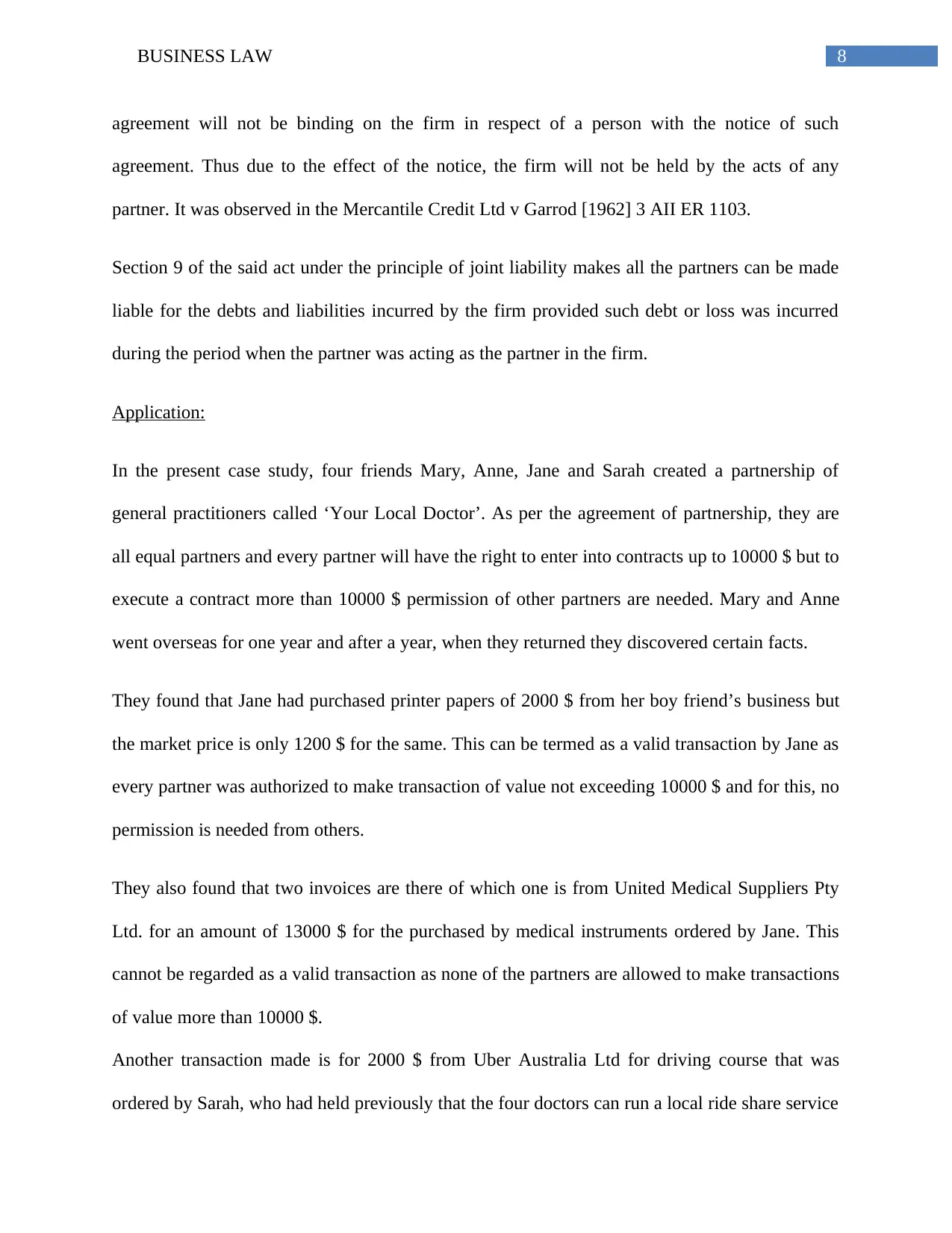
8BUSINESS LAW
agreement will not be binding on the firm in respect of a person with the notice of such
agreement. Thus due to the effect of the notice, the firm will not be held by the acts of any
partner. It was observed in the Mercantile Credit Ltd v Garrod [1962] 3 AII ER 1103.
Section 9 of the said act under the principle of joint liability makes all the partners can be made
liable for the debts and liabilities incurred by the firm provided such debt or loss was incurred
during the period when the partner was acting as the partner in the firm.
Application:
In the present case study, four friends Mary, Anne, Jane and Sarah created a partnership of
general practitioners called ‘Your Local Doctor’. As per the agreement of partnership, they are
all equal partners and every partner will have the right to enter into contracts up to 10000 $ but to
execute a contract more than 10000 $ permission of other partners are needed. Mary and Anne
went overseas for one year and after a year, when they returned they discovered certain facts.
They found that Jane had purchased printer papers of 2000 $ from her boy friend’s business but
the market price is only 1200 $ for the same. This can be termed as a valid transaction by Jane as
every partner was authorized to make transaction of value not exceeding 10000 $ and for this, no
permission is needed from others.
They also found that two invoices are there of which one is from United Medical Suppliers Pty
Ltd. for an amount of 13000 $ for the purchased by medical instruments ordered by Jane. This
cannot be regarded as a valid transaction as none of the partners are allowed to make transactions
of value more than 10000 $.
Another transaction made is for 2000 $ from Uber Australia Ltd for driving course that was
ordered by Sarah, who had held previously that the four doctors can run a local ride share service
agreement will not be binding on the firm in respect of a person with the notice of such
agreement. Thus due to the effect of the notice, the firm will not be held by the acts of any
partner. It was observed in the Mercantile Credit Ltd v Garrod [1962] 3 AII ER 1103.
Section 9 of the said act under the principle of joint liability makes all the partners can be made
liable for the debts and liabilities incurred by the firm provided such debt or loss was incurred
during the period when the partner was acting as the partner in the firm.
Application:
In the present case study, four friends Mary, Anne, Jane and Sarah created a partnership of
general practitioners called ‘Your Local Doctor’. As per the agreement of partnership, they are
all equal partners and every partner will have the right to enter into contracts up to 10000 $ but to
execute a contract more than 10000 $ permission of other partners are needed. Mary and Anne
went overseas for one year and after a year, when they returned they discovered certain facts.
They found that Jane had purchased printer papers of 2000 $ from her boy friend’s business but
the market price is only 1200 $ for the same. This can be termed as a valid transaction by Jane as
every partner was authorized to make transaction of value not exceeding 10000 $ and for this, no
permission is needed from others.
They also found that two invoices are there of which one is from United Medical Suppliers Pty
Ltd. for an amount of 13000 $ for the purchased by medical instruments ordered by Jane. This
cannot be regarded as a valid transaction as none of the partners are allowed to make transactions
of value more than 10000 $.
Another transaction made is for 2000 $ from Uber Australia Ltd for driving course that was
ordered by Sarah, who had held previously that the four doctors can run a local ride share service
⊘ This is a preview!⊘
Do you want full access?
Subscribe today to unlock all pages.

Trusted by 1+ million students worldwide
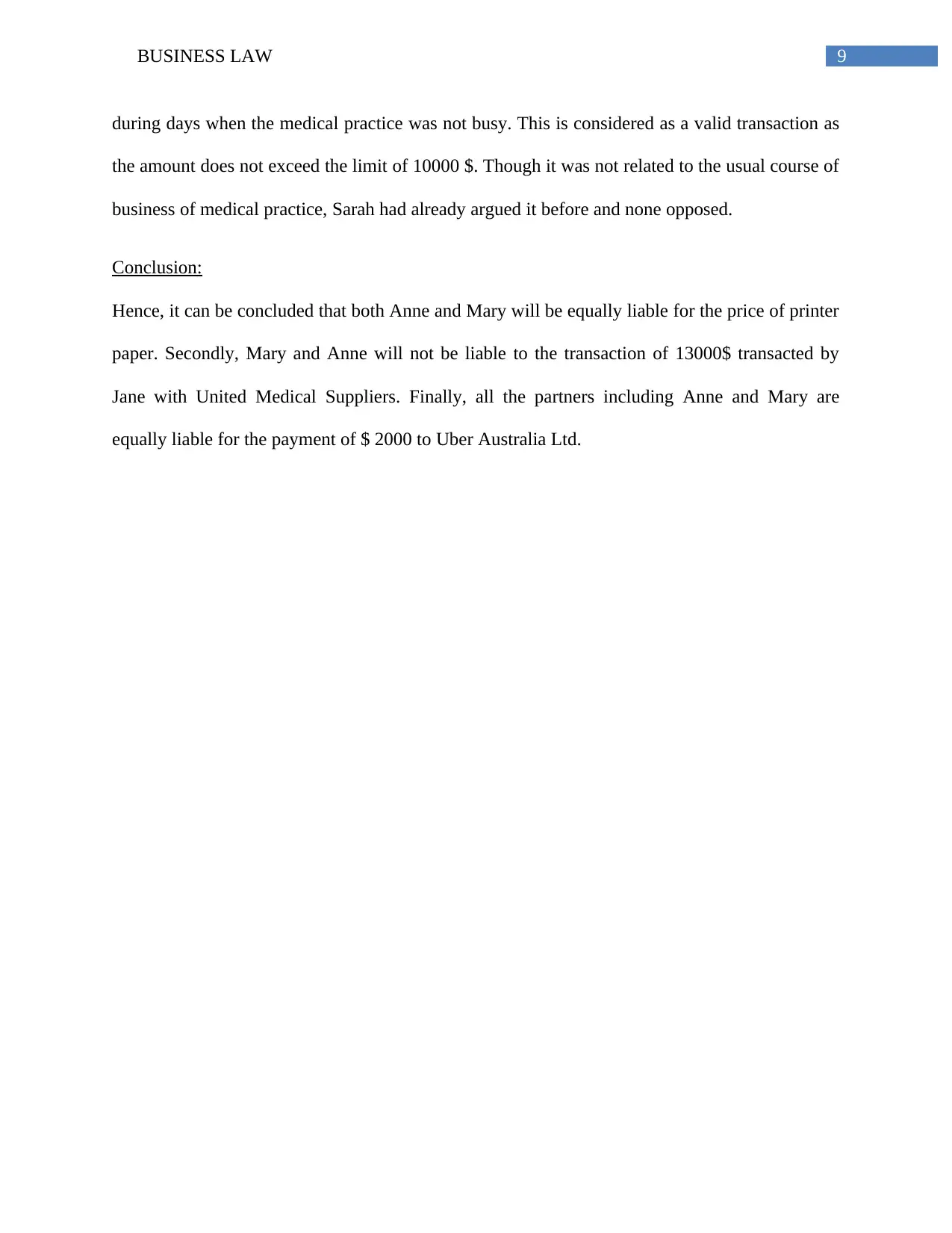
9BUSINESS LAW
during days when the medical practice was not busy. This is considered as a valid transaction as
the amount does not exceed the limit of 10000 $. Though it was not related to the usual course of
business of medical practice, Sarah had already argued it before and none opposed.
Conclusion:
Hence, it can be concluded that both Anne and Mary will be equally liable for the price of printer
paper. Secondly, Mary and Anne will not be liable to the transaction of 13000$ transacted by
Jane with United Medical Suppliers. Finally, all the partners including Anne and Mary are
equally liable for the payment of $ 2000 to Uber Australia Ltd.
during days when the medical practice was not busy. This is considered as a valid transaction as
the amount does not exceed the limit of 10000 $. Though it was not related to the usual course of
business of medical practice, Sarah had already argued it before and none opposed.
Conclusion:
Hence, it can be concluded that both Anne and Mary will be equally liable for the price of printer
paper. Secondly, Mary and Anne will not be liable to the transaction of 13000$ transacted by
Jane with United Medical Suppliers. Finally, all the partners including Anne and Mary are
equally liable for the payment of $ 2000 to Uber Australia Ltd.
Paraphrase This Document
Need a fresh take? Get an instant paraphrase of this document with our AI Paraphraser
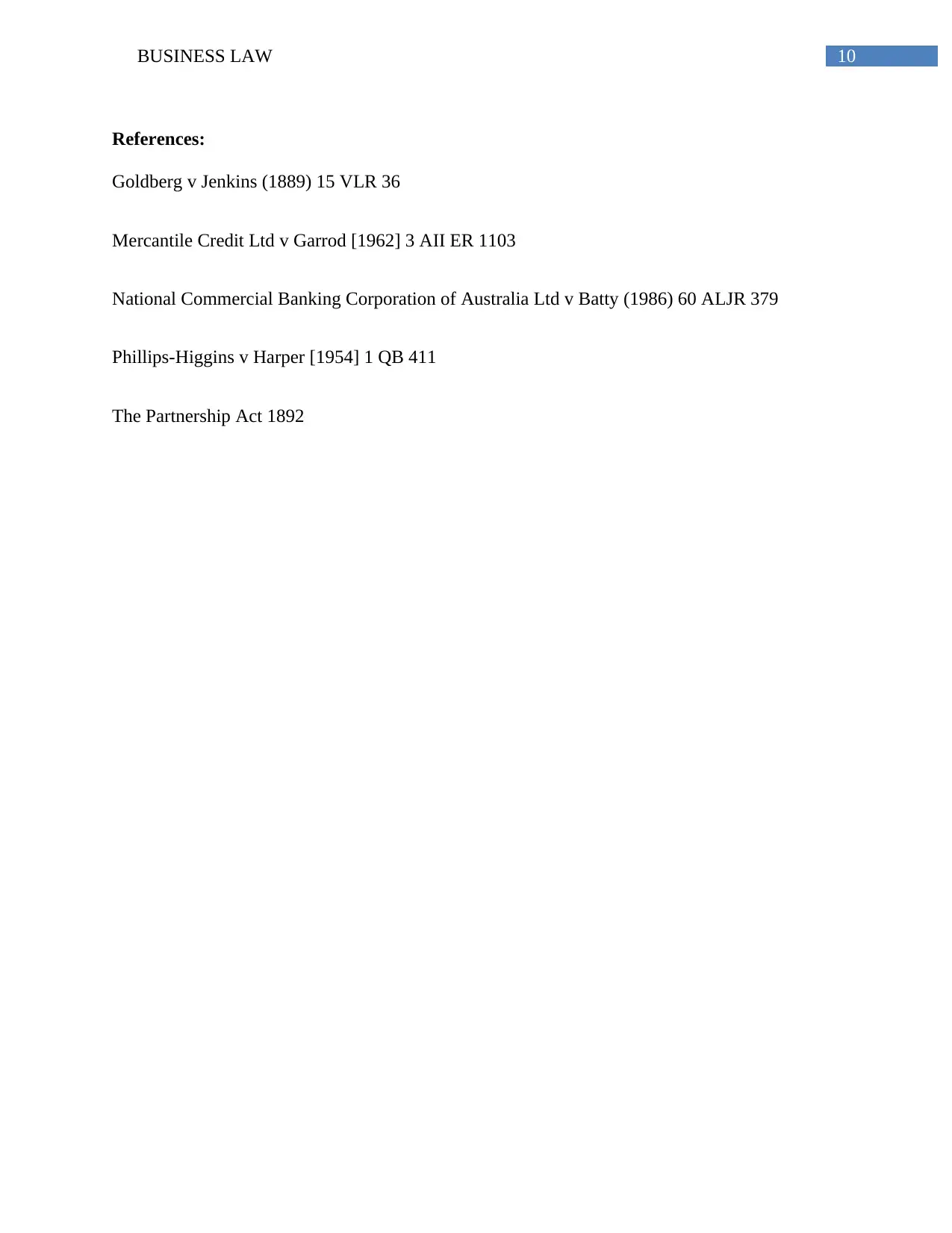
10BUSINESS LAW
References:
Goldberg v Jenkins (1889) 15 VLR 36
Mercantile Credit Ltd v Garrod [1962] 3 AII ER 1103
National Commercial Banking Corporation of Australia Ltd v Batty (1986) 60 ALJR 379
Phillips-Higgins v Harper [1954] 1 QB 411
The Partnership Act 1892
References:
Goldberg v Jenkins (1889) 15 VLR 36
Mercantile Credit Ltd v Garrod [1962] 3 AII ER 1103
National Commercial Banking Corporation of Australia Ltd v Batty (1986) 60 ALJR 379
Phillips-Higgins v Harper [1954] 1 QB 411
The Partnership Act 1892
1 out of 11
Related Documents
Your All-in-One AI-Powered Toolkit for Academic Success.
+13062052269
info@desklib.com
Available 24*7 on WhatsApp / Email
![[object Object]](/_next/static/media/star-bottom.7253800d.svg)
Unlock your academic potential
Copyright © 2020–2026 A2Z Services. All Rights Reserved. Developed and managed by ZUCOL.





